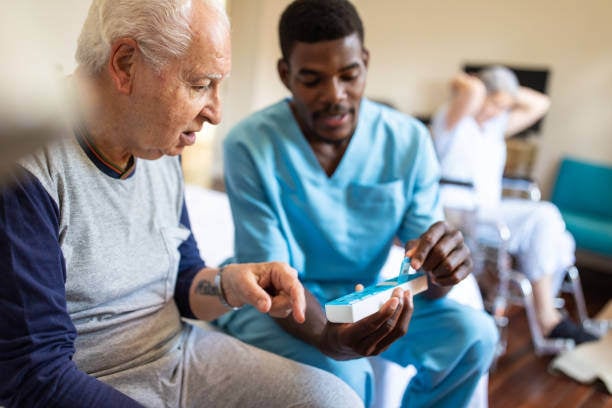
Day in the Life of a CNA: How CNA Training in Orlando Prepares You for the Job
Introduction: From Classroom to Patient Care
Becoming a Certified Nursing Assistant (CNA) is one of the most direct and impactful ways to enter the healthcare field. But what does a typical day look like for a CNA, and how does CNA Training in Orlando prepare you for the demands and rewards of the role?
At Gabriel Health Institute, we’ve trained over 15,000 CNAs in Central Florida, helping them transition from students to confident healthcare professionals. In this in-depth guide, we’ll walk you through a “day in the life” of a CNA, while showing you exactly how our Orlando-based training equips you for success from day one on the job.
Index
-
Morning Routine and Shift Start
-
Vital Signs and Patient Assessments
-
Assisting with Daily Living Activities
-
Documentation and Communication
-
Supporting Mobility and Physical Comfort
-
Mealtime Assistance and Nutritional Support
-
Emotional Care and Patient Interaction
-
End-of-Shift Duties and Reporting
-
How CNA Training in Orlando Prepares You for These Responsibilities
-
Conclusion and Call to Action
1. Morning Routine and Shift Start
Most CNAs begin their day early—whether working in a hospital, nursing home, or assisted living facility. A shift typically starts with:
-
Receiving Patient Assignments: You’ll be given a list of patients and a summary of their care needs.
-
Reviewing Care Plans: Understanding each patient’s individual requirements is key to providing tailored care.
-
Organizing Your Day: Experienced CNAs prioritize urgent tasks while ensuring every patient gets consistent attention.
2. Vital Signs and Patient Assessments
One of the first tasks in a CNA’s day is checking patients’ vital signs, which may include:
-
Blood pressure
-
Pulse rate
-
Respiratory rate
-
Temperature
-
Oxygen saturation
Why Training Matters: At Gabriel Health Institute, we dedicate significant lab time to practicing accurate measurements and recognizing when results may indicate a problem—skills that could save a life.
3. Assisting with Daily Living Activities
CNAs are essential in helping patients maintain dignity and independence. Daily living activities include:
-
Bathing and personal hygiene
-
Dressing and grooming
-
Oral care
-
Changing bed linens
Real-World Readiness: Our CNA classes in Orlando include hands-on training with mannequins and role-play exercises so students are comfortable providing personal care before working with real patients.
4. Documentation and Communication
Keeping accurate records is critical in healthcare. CNAs document patient care activities and communicate observations to nurses and other staff.
-
Charting: Recording care provided and patient responses.
-
Reporting Changes: Alerting the nurse if a patient’s condition changes.
In Training: We teach proper documentation standards so you’re ready to comply with facility policies from your first shift.
5. Supporting Mobility and Physical Comfort
A key part of a CNA’s role is helping patients move safely and comfortably:
-
Assisting with transfers from bed to chair.
-
Using gait belts or mechanical lifts.
-
Helping with walking exercises.
Why It Matters: Proper mobility assistance prevents patient injuries and reduces strain on your body—techniques you’ll master during our hands-on CNA training in Orlando.
6. Mealtime Assistance and Nutritional Support
CNAs often help patients during mealtimes, ensuring they get the nutrition they need. This includes:
-
Helping with feeding.
-
Monitoring dietary restrictions.
-
Recording food and fluid intake.
Prepared in Training: Our program includes scenarios for assisting patients with different dietary needs, from pureed diets to thickened liquids.
7. Emotional Care and Patient Interaction
CNAs are often the healthcare workers who spend the most time with patients. That means you’ll have many opportunities to provide emotional support:
-
Offering a listening ear.
-
Providing reassurance during procedures.
-
Engaging patients in conversation or light activities.
Our Approach: We emphasize empathy and active listening in our CNA classes to help you connect with patients on a personal level.
8. End-of-Shift Duties and Reporting
Before the shift ends, CNAs:
-
Complete final rounds to ensure all patients are comfortable.
-
Update charts with the day’s care activities.
-
Communicate with incoming staff about patient needs and changes.
Why This Matters: Consistent communication ensures continuity of care—a skill we stress throughout our training program.
9. How CNA Training in Orlando Prepares You for These Responsibilities
At Gabriel Health Institute, our CNA Training in Orlando goes beyond the basics:
-
Hands-On Labs: Practice every essential CNA skill before working with real patients.
-
Simulated Scenarios: Experience realistic patient interactions to prepare for common and challenging situations.
-
State Exam Preparation: Master both the written and clinical skills portions of the Florida CNA exam.
-
Career Support: Job fairs, employer connections, and resume assistance to help you land a job quickly.
We make sure every graduate leaves with the knowledge, skills, and confidence to excel in any healthcare setting.
10. Conclusion and Call to Action
A CNA’s day is filled with meaningful interactions, essential care tasks, and opportunities to make a difference in patients’ lives. From taking vital signs to providing emotional comfort, CNAs are the heart of healthcare—and the right training makes all the difference.
Call to Action: Ready to start your own CNA journey? Get started today by scheduling a free call with an advisor or booking a free class preview at Gabriel Health Institute. See firsthand how our hands-on training in Orlando prepares you for the job and sets you up for career success.
Keywords
-
CNA Training Orlando
-
CNA Training in Orlando
-
CNA Classes Orlando
-
CNA Schools Orlando
-
CNA Certification Orlando
-
Day in the Life of a CNA
-
CNA Career in Orlando




